PMQs was a rightly sombre affair, coming as it did only a few hours after the death of Labour MP Paul Goggins was announced. It has been striking to hear many MPs of all political persuasions pay tribute to Goggins as a ‘decent’ and ‘kind’ man, and those tributes were echoed in the Chamber. These two qualities are rarely trumpeted in politics and yet when someone does possess them, they have a profound impact on those around them.
Ed Miliband split his questions between flooding and fixed-odds betting terminals (FOBTs). His first tranche, on flooding, was still rather sombre and the Labour leader and the Prime Minister both sought consensus. The second came after an angry (and factually correct) question from Diane Abbott about the number of households on housing benefit who are actually in work, and was a rather more political attack on the government’s position on FOBTs. It turned, strangely, into a contest between the Prime Minister and Ed Miliband about who was better at banning things, with the PM reminding Ed Miliband about his own party’s involvement in relaxing gambling legislation. But Cameron did suggest that there was an appetite in government to look at this problem (although his aides later explained that this was through the existing review on FOBTs, while Labour is demanding action now because it says the evidence is already clear).
But it wasn’t so much the ding-dong between the PM and his opposite number that was striking today. His assertion in response to Tim Farron that he had a suspicion the recent storms and flooding were at least in part connected to climate change will certainly ruffle some feathers in his own party – and there will be calls for Downing Street to produce the evidence the PM has seen in the past few weeks linking the two.
The other thing worth noting was that the Prime Minister was very keen indeed to shoehorn in the new Conservative line about the economy, which is a warning about the cost-of-reluctance to cut benefits. The PM managed to get this line into a surprising array of questions. In one case, he dodged a question about whether the government was planning to cut benefits for disabled people again by telling the chamber that access to kidney dialysis was important and that the government was safeguarding that by being able to spend more on the NHS as a result of its difficult decisions on welfare. He also dodged committing to a post-2015 position on pensioner benefits by telling the chamber that he could safeguard the pensions triple lock because the government had taken the difficult decision to raise the pension age. Any decision that the government now makes to give anyone anything will clearly be framed in these terms, with a warning about Labour’s reluctance to make the necessary difficult decisions.







Comments